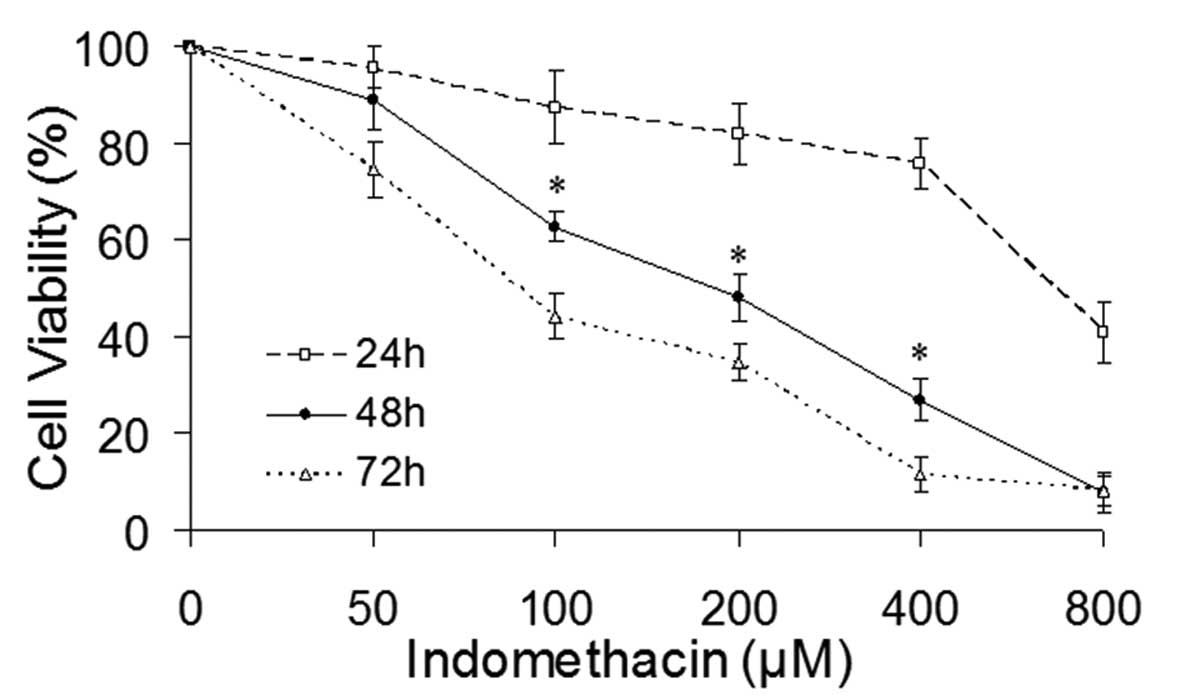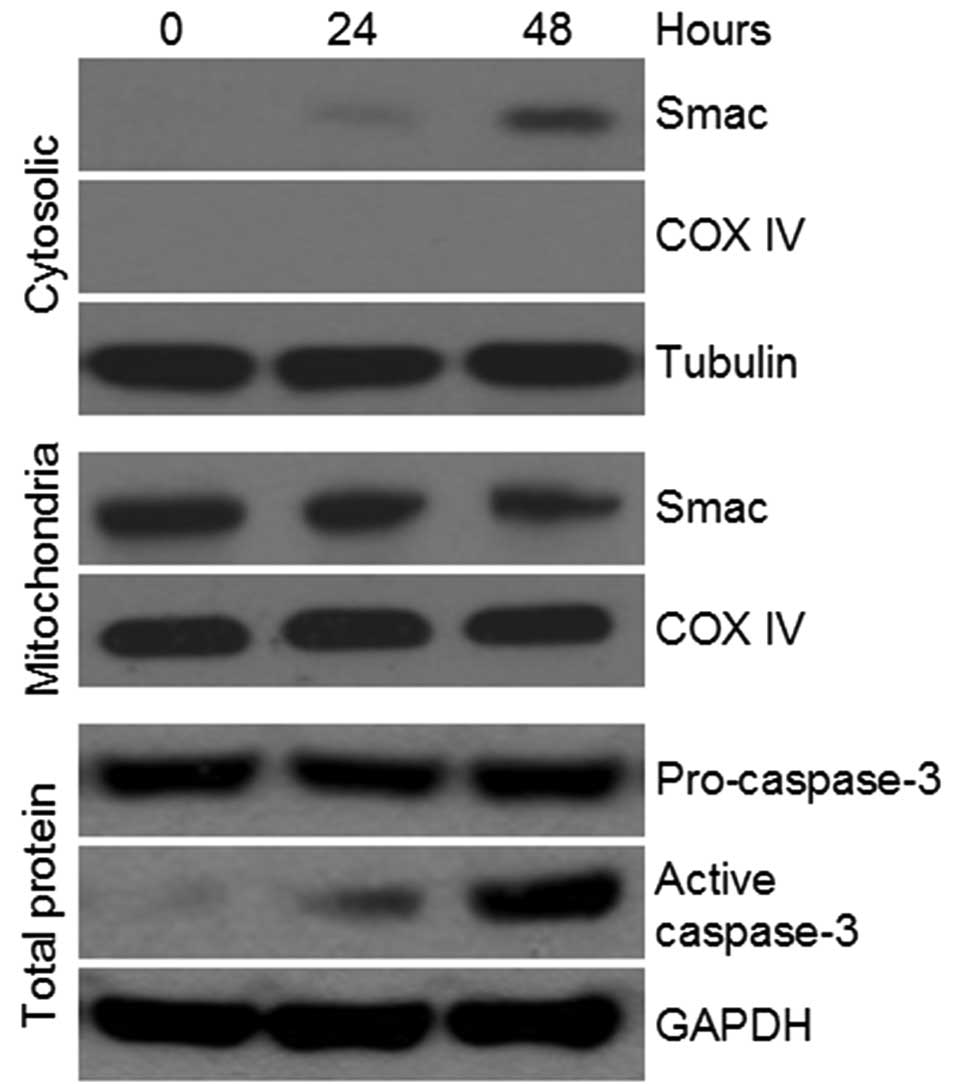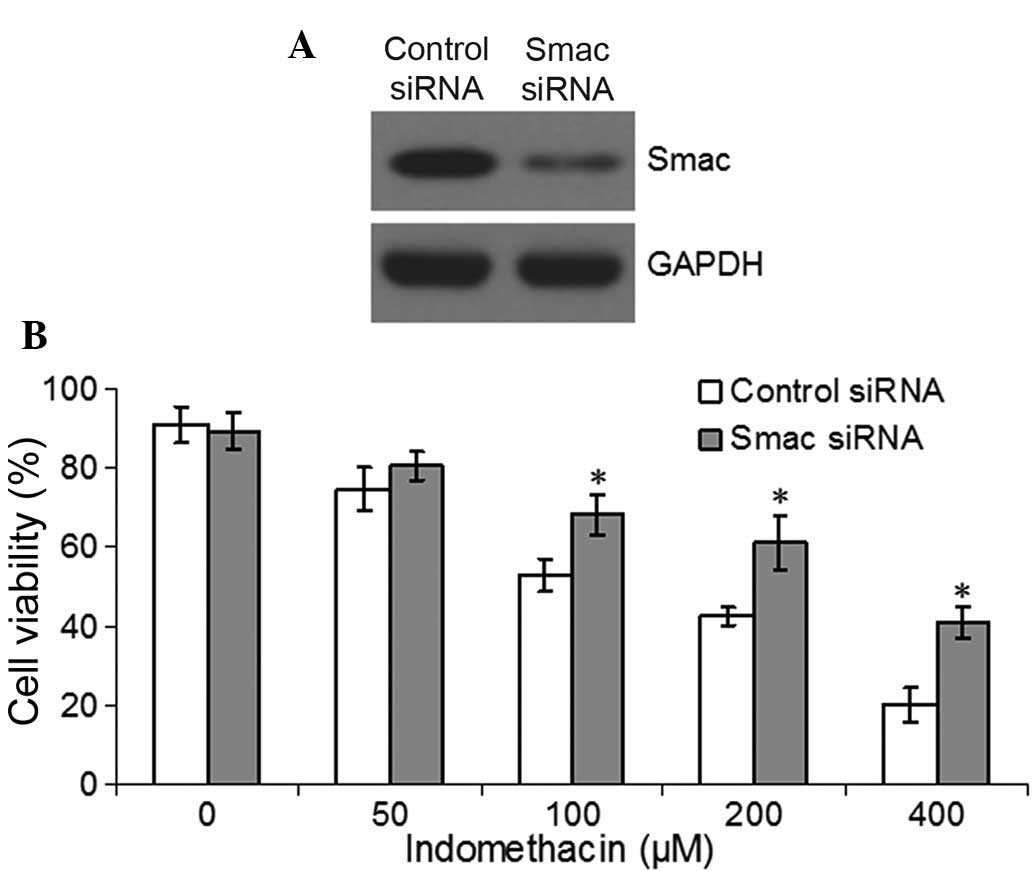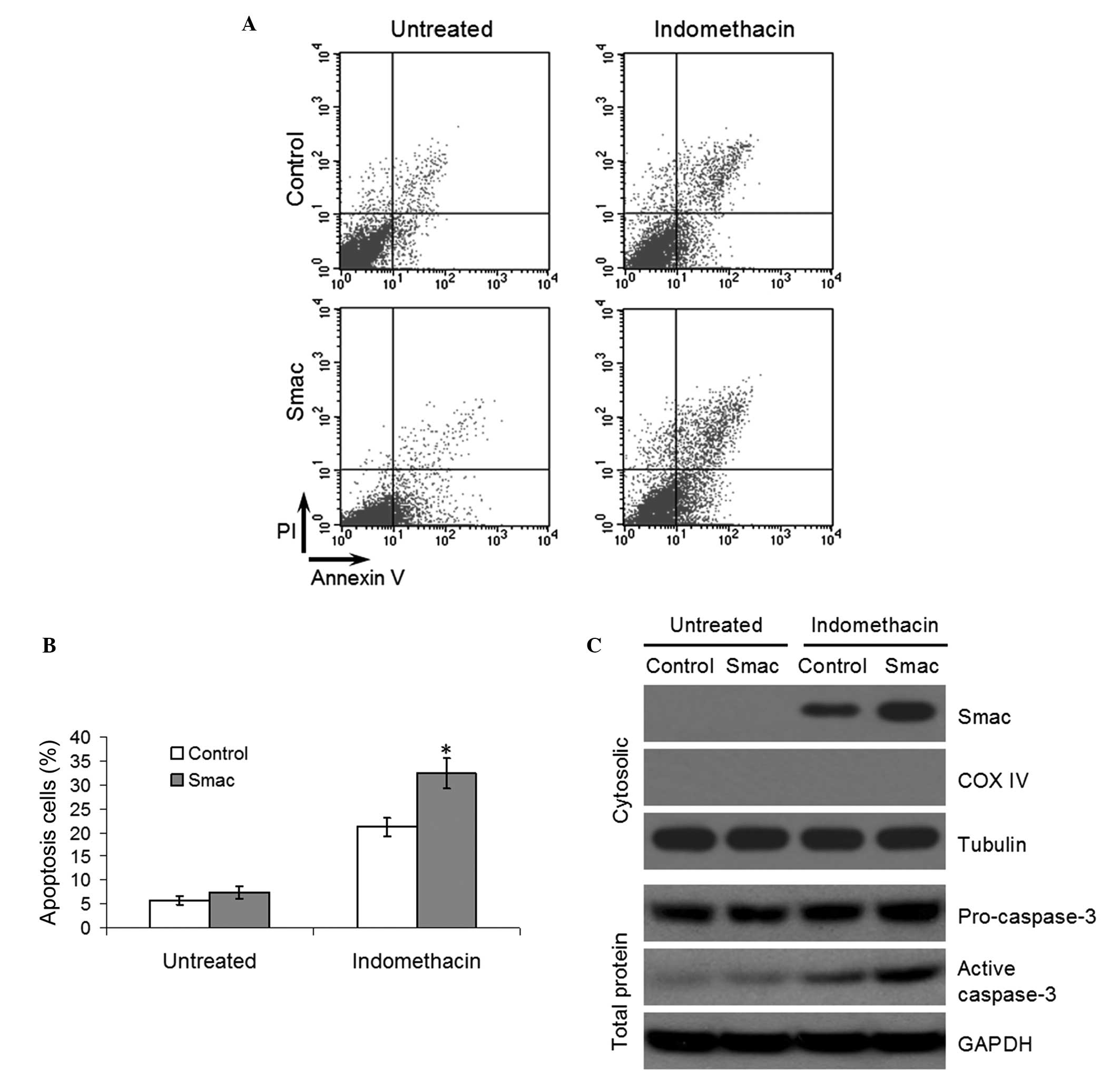|
1
|
Du C, Fang M, Li Y, Li L and Wang X: Smac,
a mitochondrial protein that promotes cytochrome c-dependent
caspase activation by eliminating IAP inhibition. Cell. 102:33–42.
2000. View Article : Google Scholar : PubMed/NCBI
|
|
2
|
Verhagen AM, Ekert PG, Pakusch M, et al:
Identification of DIABLO, a mammalian protein that promotes
apoptosis by binding to and antagonizing IAP proteins. Cell.
102:43–53. 2000. View Article : Google Scholar : PubMed/NCBI
|
|
3
|
Qin S, Yang C, Li S, Xu C, Zhao Y and Ren
H: Smac: Its role in apoptosis induction and use in lung cancer
diagnosis and treatment. Cancer Lett. 318:9–13. 2012. View Article : Google Scholar : PubMed/NCBI
|
|
4
|
Martinez-Ruiz G, Maldonado V,
Ceballos-Cancino G, Grajeda JP and Melendez-Zajgla J: Role of
Smac/DIABLO in cancer progression. J Exp Clin Cancer Res.
27:482008. View Article : Google Scholar : PubMed/NCBI
|
|
5
|
Srinivasula SM, Hegde R, Saleh A, et al: A
conserved XIAP-interaction motif in caspase-9 and Smac/DIABLO
regulates caspase activity and apoptosis. Nature. 410:112–116.
2001. View
Article : Google Scholar : PubMed/NCBI
|
|
6
|
Liu WW, Liu Y, Liang S, Wu JH, Wang ZC and
Gong SL: Hypoxia- and radiation-induced overexpression of Smac by
an adenoviral vector and its effects on cell cycle and apoptosis in
MDA-MB-231 human breast cancer cells. Exp Ther Med. 6:1560–1564.
2013.PubMed/NCBI
|
|
7
|
Liu BH, Chen L, Li SR, Wang ZX and Cheng
WG: Smac/DIABLO regulates the apoptosis of hypertrophic scar
fibroblasts. Int J Mol Med. 32:615–622. 2013.PubMed/NCBI
|
|
8
|
Thun MJ, Jacobs EJ and Patrono C: The role
of aspirin in cancer prevention. Nat Rev Clin Oncol. 9:259–267.
2012. View Article : Google Scholar : PubMed/NCBI
|
|
9
|
Kohli M, Yu J, Seaman C, et al:
SMAC/Diablo-dependent apoptosis induced by nonsteroidal anti
inflammatory drugs (NSAIDs) in colon cancer cells. Proc Natl Acad
Sci USA. 101:16897–16902. 2004. View Article : Google Scholar
|
|
10
|
Bank A, Wang P, Du C, Yu J and Zhang L:
SMAC mimetics sensitize nonsteroidal anti-inflammatory drug-induced
apoptosis by promoting caspase-3-mediated cytochrome c release.
Cancer Res. 68:276–284. 2008. View Article : Google Scholar : PubMed/NCBI
|
|
11
|
Jemal A, Bray F, Center MM, Ferlay J, Ward
E and Forman D: Global cancer statistics. CA Cancer J Clin.
61:69–90. 2011. View Article : Google Scholar : PubMed/NCBI
|
|
12
|
Bardou M, Barkun AN, Ghosn J, Hudson M and
Rahme E: Effect of chronic intake of NSAIDs and cyclooxygenase
2-selective inhibitors on esophageal cancer incidence. Clin
Gastroenterol Hepatol. 2:880–887. 2004. View Article : Google Scholar : PubMed/NCBI
|
|
13
|
Corley DA, Kerlikowske K, Verma R and
Buffler P: Protective association of aspirin/NSAIDs and esophageal
cancer: a systematic review and meta-analysis. Gastroenterology.
124:47–56. 2003. View Article : Google Scholar : PubMed/NCBI
|
|
14
|
Qin SD, Ren H, Li XJ, et al: Construction
and expression of eukaryotic expression plasmid pcDNA3.1-smac. Xi
Bao Yu Fen Zi Mian Yi Xue Za Zhi. 27:146–149. 2011.In Chinese.
PubMed/NCBI
|
|
15
|
Gurpinar E, Grizzle WE and Piazza GA:
NSAIDs inhibit tumorigenesis, but how? Clin Cancer Res.
20:1104–1113. 2014. View Article : Google Scholar :
|
|
16
|
Antonakopoulos N and Karamanolis DG: The
role of NSAIDS in colon cancer prevention. Hepatogastroenterology.
54:1694–1700. 2007.PubMed/NCBI
|
|
17
|
Zhang YJ, Dai Q, Wu SM, et al:
Susceptibility for NSAIDs-induced apoptosis correlates to p53 gene
status in gastric cancer cells. Cancer Invest. 26:868–877. 2008.
View Article : Google Scholar : PubMed/NCBI
|
|
18
|
Brasky TM, Bonner MR, Moysich KB, et al:
Non-steroidal anti-inflammatory drugs (NSAIDs) and breast cancer
risk: differences by molecular subtype. Cancer Causes Control.
22:965–975. 2011. View Article : Google Scholar : PubMed/NCBI
|
|
19
|
Cheng I, Liu X, Plummer SJ, Krumroy LM,
Casey G and Witte JS: COX2 genetic variation, NSAIDs, and advanced
prostate cancer risk. Br J Cancer. 97:557–561. 2007. View Article : Google Scholar : PubMed/NCBI
|
|
20
|
Skriver MV, Nørgaard M, Poulsen AH, et al:
Use of nonaspirin NSAIDs and risk of lung cancer. Int J Cancer.
117:873–876. 2005. View Article : Google Scholar : PubMed/NCBI
|
|
21
|
Jana NR: NSAIDs and apoptosis. Cell Mol
Life Sci. 65:1295–1301. 2008. View Article : Google Scholar : PubMed/NCBI
|
|
22
|
Tarnawski AS and Jones MK: Inhibition of
angiogenesis by NSAIDs: molecular mechanisms and clinical
implications. J Mol Med (Berl). 81:627–636. 2003. View Article : Google Scholar
|
|
23
|
Sun L and Yu S: Meta-analysis:
non-steroidal anti-inflammatory drug use and the risk of esophageal
squamous cell carcinoma. Dis Esophagus. 24:544–549. 2011.
View Article : Google Scholar : PubMed/NCBI
|
|
24
|
Liao LM, Vaughan TL, Corley DA, et al:
Nonsteroidal anti-inflammatory drug use reduces risk of
adenocarcinomas of the esophagus and esophagogastric junction in a
pooled analysis. Gastroenterology. 142:442–485. 2012. View Article : Google Scholar
|
|
25
|
Cai JB, Zhang CX, Luo JW and Wang D: A
study of 131iodine labeling of indomethacin, its in vivo
biological distribution in Lewis-bearing lung cancer, and its
induction of apoptosis in lung cancer. Saudi Med J. 32:15–22.
2011.PubMed/NCBI
|
|
26
|
Pelzmann M, Thurnher D, Gedlicka C,
Martinek H and Knerer B: Nimesulide and indomethacin induce
apoptosis in head and neck cancer cells. J Oral Pathol Med.
33:607–613. 2004. View Article : Google Scholar : PubMed/NCBI
|
|
27
|
Qin S, Yang C, Wang X, et al:
Overexpression of Smac promotes Cisplatin-induced apoptosis by
activating caspase-3 and caspase-9 in lung cancer A549 cells.
Cancer Biother Radiopharm. 28:177–182. 2013. View Article : Google Scholar
|
|
28
|
Zhang XD, Zhang XY, Gray CP, Nguyen T and
Hersey P: Tumor necrosis factor-related apoptosis-inducing
ligand-induced apoptosis of human melanoma is regulated by
Smac/DIABLO release from mitochondria. Cancer Res. 61:7339–7348.
2001.PubMed/NCBI
|
|
29
|
Greer RM, Peyton M, Larsen JE, et al: SMAC
mimetic (JP1201) sensitizes non-small cell lung cancers to multiple
chemotherapy agents in an IAP-dependent but TNF-α-independent
manner. Cancer Res. 71:7640–7648. 2011. View Article : Google Scholar : PubMed/NCBI
|
|
30
|
Xu Y, Zhou L, Huang J, et al: Role of Smac
in determining the chemotherapeutic response of esophageal squamous
cell carcinoma. Clin Cancer Res. 17:5412–5422. 2011. View Article : Google Scholar : PubMed/NCBI
|
|
31
|
Du N, Yang B, Hu L, et al: Overexpression
of Smac gene erhanced chemotherapeutic sensitivity of esophageal
cancer cell line Eca109 to cisplatin. Xi Bao Yu Fen Mian Yi Xue Za
Zhi. 28:344–346. 2012.In Chinese.
|
|
32
|
Fulda S: Molecular pathways: targeting
death receptors and smac mimetics. Clin Cancer Res. 20:3915–3920.
2014. View Article : Google Scholar : PubMed/NCBI
|
|
33
|
Bai L, Smith DC and Wang S: Small-molecule
SMAC mimetics as new cancer therapeutics. Pharmacol Ther.
144:82–95. 2014. View Article : Google Scholar : PubMed/NCBI
|
|
34
|
Li L, Thomas RM, Suzuki H, De Brabander
JK, Wang X and Harran PG: A small molecule Smac mimic potentiates
TRAIL- and TNFalpha-mediated cell death. Science. 305:1471–1474.
2004. View Article : Google Scholar : PubMed/NCBI
|
|
35
|
Petersen SL, Wang L, Yalcin-Chin A, et al:
Autocrine TNFalpha signaling renders human cancer cells susceptible
to smac-mimetic-induced apoptosis. Cancer Cell. 12:445–456. 2007.
View Article : Google Scholar : PubMed/NCBI
|
|
36
|
Mao HL, Pang Y, Zhang X, et al: Smac
peptide potentiates TRAIL- or paclitaxel-mediated ovarian cancer
cell death in vitro and in vivo. Oncol Rep. 29:515–522. 2013.
|
|
37
|
Bahadur S, Keshri L and Pathak K: Adverse
drug reactions and safety considerations of NSAIDs: clinical
analysis. Curr Drug Saf. 6:310–7. 2011. View Article : Google Scholar
|




















